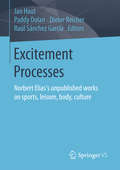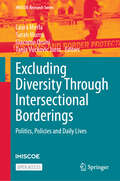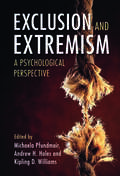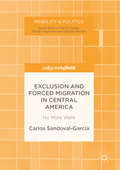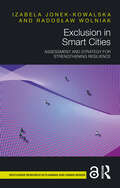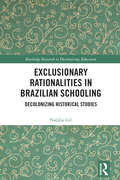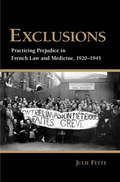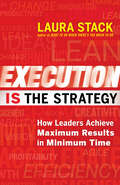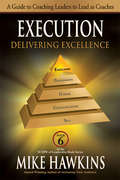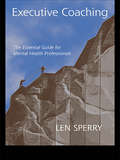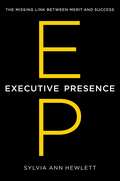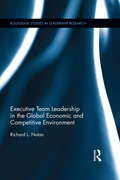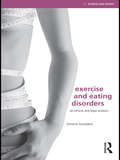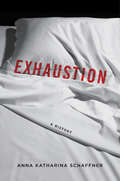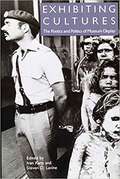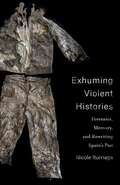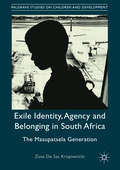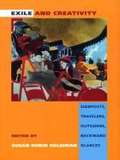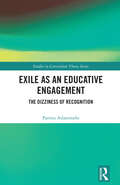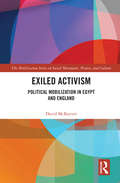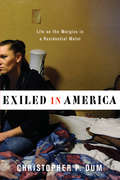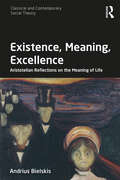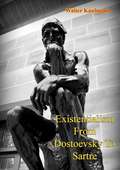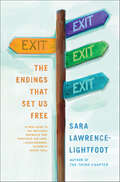- Table View
- List View
Excitement Processes: Norbert Elias's unpublished works on sports, leisure, body, culture
by Jan Haut Paddy Dolan Dieter Reicher Raúl Sánchez GarcíaThe book focuses on major aspects of Norbert Elias's social theory through research on supposed “minor” topics, such as manners, sports, leisure and cultural practices. While many of his publications became essential for scholars in the different disciplines concerned, the development of the figurational approach towards these fields was not always completed. The edited volume picks up some lose ends by including archive manuscripts by Elias on the genesis of sport, developments of cultural practices, and the sociology of the body, which are published here for the very first time. Based on critical reviews of these texts, international experts show how the new material adds up to Elias’s oeuvre and how it can be fruitfully applied to current research.
Excluding Diversity Through Intersectional Borderings: Politics, Policies and Daily Lives (IMISCOE Research Series)
by Laura Merla Sarah Murru Giacomo Orsini Tanja Vuckovic JurosThis open access book critically examines how discourses and policies target and exclude migrants and their families in Europe and North America along racial, gender and sexuality lines, and how these exclusions are experienced and resisted. Building on the influential notion of intersectional borderings, it delves deep into how these discourses converge and diverge, highlighting the underlying normative constructs of family, gender, and sexuality. First, it examines how radical-right and conservative political movements perpetuate exclusionary practices and how they become institutionalized in migration, welfare, and family policies. Second, it examines the dynamic responses they provoke—both resistance and reinforcement—among those affected in their everyday lives. Bringing together studies from political and social sciences, it offers a vital contribution to the expanding field of migrant family governance and exclusion and is essential for understanding the complex processes of exclusion and the movements that challenge and sustain them. It expands academic discussions on populism and the politics of exclusion by linking them to the politicization of intimacy and family life. With diverse case studies from Europe, North, and Central America, it appeals to students, academics, and policymakers, informing future mobilizations against discriminatory and exclusionary tendencies in politics and society.
Exclusion and Extremism: A Psychological Perspective
by Kipling D. Williams Michaela Pfundmair Andrew H. HalesThe question of how people develop extreme, radical or even terrorist ideas and behaviors is one which is attracting more and more scientific attention. There are many factors that contribute to such extremist attitudes. This book focuses on one specific contributor which has received only little attention in the past: social exclusion. Recent research shows that being kept apart from others, physically or emotionally, is a powerful event in people's lives. The chapters provide an overview of the existing body of research for the first time and explore the exclusion-extremism link in depth by gathering together a seminal collection of essays, written by leading social psychologists. Timely, novel, and highly instructive, this volume delivers an expert understanding of psychological underpinnings of such behavior and offer inspiration for future research.
Exclusion and Forced Migration in Central America: No More Walls (Mobility & Politics)
by Carlos Sandoval-GarcíaThis book marks a critical contribution to the intercultural dialogue about immigration. Each year, thousands of Central Americans leave their countries and walk across Mexico, seeking to reach the United States. The author explores the dispossession process that drives these migrants from their homes and argues that they are caught in a kind of trap: forced to emigrate, but impeded to immigrate. This trap is discussed empirically through the analysis of immigration policies implemented by the United States government and ethnographic fieldwork carried out in some of “albergues” (shelters).
Exclusion in Smart Cities: Assessment and Strategy for Strengthening Resilience (Routledge Research in Planning and Urban Design)
by Izabela Jonek-Kowalska Radosław WolniakSmart Cities are fascinating, but they also have a dark side that little is said or written about. One issue is the possibility of generating various types of exclusion. For this reason, this book will develop principles for assessing the inclusiveness of Smart Cities and outline strategies for strengthening urban resistance to exclusion.The book will consider the essence, scale and types of exclusion and include analysis of inclusiveness in practice in the assessment and activities of Smart Cities. The research assesses Smart City literature, with particular emphasis on criticism of the Smart City concept and exclusion generated in smart urban structures, critically analyses the principles and indicators used in international inclusive Smart City rankings, highlights case studies on best practices for preventing exclusions in Smart Cities, and uses trend analysis to assess the scale and intensity of exclusion threats.This book can be used as a compendium of knowledge about exclusions in Smart Cities by both researchers and students, as well as all urban stakeholders, in particular city decision-makers.
Exclusionary Rationalities in Brazilian Schooling: Decolonizing Historical Studies (Routledge Research in Decolonizing Education)
by Natália GilThrough in-depth socio-historical analysis of discourses and processes of quantification around school performance and student failure rates in Brazil, this volume highlights the prevalence of Eurocentric colonized thought that results in the persistence of exclusion bottlenecks, different trajectories according to gender, race and class, significant regional variations in the rates of failure and dropout, among other problems. Focussing on processes performed between 1918 and 2012, chapters offer rich analysis of historiographic sources including journals, newspapers, and administrative documentation to trace the development of initiatives intended to promote the democratization of Brazilian schooling. Examination of reforms including school classification, the graduated school model, admissions examinations, and automatic promotion reveal a school system which mirrors wider societal injustices and guarantees academic success for only a minority of students. Bringing a nuanced and elaborated historical perspective of the pragmatics of the selective classificatory logic in different institutional and epistemic qualities of the school organization of children and reasoning about abilities and achievement, it will appeal to scholars and researchers with interests in curriculum and assessment, the sociology of education, and the history of education.
Exclusions: Practicing Prejudice in French Law and Medicine, 1920-1945
by Julie FetteIn the 1930s, the French Third Republic banned naturalized citizens from careers in law and medicine for up to ten years after they had obtained French nationality. In 1940, the Vichy regime permanently expelled all lawyers and doctors born of foreign fathers and imposed a 2 percent quota on Jews in both professions. On the basis of extensive archival research, Julie Fette shows in Exclusions that doctors and lawyers themselves, despite their claims to embody republican virtues, persuaded the French state to enact this exclusionary legislation. At the crossroads of knowledge and power, lawyers and doctors had long been dominant forces in French society: they ran hospitals and courts, doubled as university professors, held posts in parliament and government, and administered justice and public health for the nation. Their social and political influence was crucial in spreading xenophobic attitudes and rendering them more socially acceptable in France.Fette traces the origins of this professional protectionism to the late nineteenth century, when the democratization of higher education sparked efforts by doctors and lawyers to close ranks against women and the lower classes in addition to foreigners. The legislatively imposed delays on the right to practice law and medicine remained in force until the 1970s, and only in 1997 did French lawyers and doctors formally recognize their complicity in the anti-Semitic policies of the Vichy regime. Fette's book is a powerful contribution to the argument that French public opinion favored exclusionary measures in the last years of the Third Republic and during the Holocaust.
Execution IS the Strategy: How Leaders Achieve Maximum Results in Minimum Time
by Laura StackTurn Strategy into Performance! In today’s world of rapid, disruptive change, strategy can’t be separate from execution—it has to emerge from execution. You have to continually adjust your strategy to fit new realities. But if your organization isn’t set up to be fast on its feet, you could easily go the way of Blockbuster or Borders. Laura Stack shows you how to quickly drive strategic initiatives and get great results from your team. Her LEAD Formula outlines the Four Keys to Successful Execution: the ability to Leverage your talent and resources, design an Environment to support an agile culture, create Alignment between strategic priorities and operational activities, and Drive the organization forward quickly. She includes a leadership team assessment, group reading guides, and bonus self-development resources. Stack will equip you with the knowledge, skills, and inspiration to help you hit the ground running!
Execution: Delivering Excellence (SCOPE of Leadership Book Series #6)
by Mike HawkinsThe keys to strategy and performance that deliver results. The final book in the “most comprehensive treatment of leadership I’ve ever seen by one author” (Jim Kouzes, coauthor of The Leadership Challenge).Execution: Delivering Excellence describes the capabilities that leaders need to create competitive differentiation and deliver extraordinary value. Great leaders build a culture that achieves operational excellence as well as adapts to change and seizes new opportunities. By learning the competencies of making smart decisions, fostering innovation, enabling speed, and taking action, you are able to equip your team to sustain great performance for years to come.The SCOPE of Leadership book series teaches the principles of a coaching approach to leadership and how to achieve exceptional results by working through people. You will learn a straightforward framework to guide you in developing, enabling, exhorting, inspiring, managing, and assimilating people. Benefit from the wisdom of many years of leadership, consulting, and executive coaching experience. Discover how to develop the competencies that align consistently with great leadership.
Executive Coaching: The Essential Guide for Mental Health Professionals
by Len SperryFor many mental health professionals, executive and personal coaching represent attractive alternatives to managed care practice. This book provides mental health professionals with a map of the territory of the corporate world and describes in detail the major theoretical coaching models and progressive phases. Sperry addresses both executive coaching and personal coaching, revealing the practical, ethical and legal aspects of beginning and maintaining an active coaching practice.
Executive Presence: The Missing Link Between Merit and Success
by Sylvia Ann HewlettDo you exude confidence and credibility? Can you command a room? Sylvia Ann Hewlett, one of the world's most influential business thinkers, cracks the code of Executive Presence (EP) for men and women intent on winning the next plum assignment and doing something extraordinary with their lives.You might have the qualifications to be considered for your dream job, but you won't get far unless you can signal that you're "leadership material" and that you "have what it takes." Professionals are judged on presence as well as on performance. Using a wealth of hard data--including a new nationwide survey and dozens of focus groups--Hewlett reveals EP to be a dynamic mix of three things: how you act (gravitas), how you speak (communication), and how you look (appearance). She also draws on in-depth interviews with a wide selection of admired leaders to reveal how they embody and deploy key elements of EP. This book is immensely practical. Hewlett teases out tactics that can help you raise your game and close the gap between merit and success. She offers the unvarnished advice you won't get from supportive friends and tackles head-on such touchy subjects as too-tight clothing and too-shrill voices. She shows how the standards for EP vary for men, women, multicultural, and LGBT employees, and she shares how to get meaningful feedback from politically correct bosses intent on avoiding the real issues. The good news is that EP is eminently teachable. You can learn how to "show teeth" while remaining likable, and you can teach yourself how to dress appropriately while staying true to yourself. You don't have to be born with the voice of James Earl Jones or the looks of Angelina Jolie to hurdle the EP bar. With hard facts and vivid examples, Hewlett shows you how to ace EP and fully realize your unique potential--no matter who you are, no matter where you work.
Executive Team Leadership in the Global Economic and Competitive Environment (Routledge Studies in Leadership Research)
by Richard L. NolanCorporations have continued to grow and extend their operations into the global economy to the point that the modern corporation has become larger and more influential than many sovereign countries. In this global expansion, corporations have extended their operations with little restraint—almost only limited by corporate lawyers’ imaginations. Modern corporations have become so pervasive; world populations are more dependent on them for their food, services, technologies, work and daily well-being than ever before. This book analyzes the twenty-first century forces challenging the executive leadership of the modern corporation. Lessons are drawn for corporate leaders facing these challenges: turbulent times, balancing creators and stewards, managing company culture, managing by wire, incorporating global virtual organization structures, and managing sustained innovation. Nolan concludes with guidelines on creating a leadership agenda for transforming the corporation to successfully compete in the realities of the new corporate world of the twenty-first century.
Exercise and Eating Disorders: An Ethical and Legal Analysis (Ethics and Sport)
by Simona GiordanoEating disorders (EDs) have become a social epidemic in the developed world. This book addresses the close links between EDs and exercise, helping us to understand why people with EDs often exercise to excessive and potentially harmful levels. This is also the first book to examine this issue from an ethical and legal perspective, identifying the rights and responsibilities of people with EDs, their families and the fitness professionals and clinicians that work with them. The book offers an accessible account of EDs and closely examines the concept of addiction. Drawing on a wide range of medical, psychological, physiological, sociological and philosophical sources, the book examines the benefits and risks of exercise for the ED population, explores the links between EDs and other abuses of the body in the sports environment and addresses the issue of athletes with disordered eating behaviour. Importantly, the book also surveys current legislation and professional codes of conduct that guide the work of fitness professionals and clinicians in this area and presents a clear and thorough set of case histories and action points to help professionals better understand, and care for, their clients with EDs. Exercise and Eating Disorders is important reading for students of applied ethics, medical ethics and the ethics of sport, as well as for fitness professionals, psychiatrists, clinical psychologists, sports coaches and sport and exercise scientists looking to improve their understanding of this important issue.
Exhaustion: A History
by Anna K. SchaffnerToday our fatigue feels chronic; our anxieties, amplified. Proliferating technologies command our attention. Many people complain of burnout, and economic instability and the threat of ecological catastrophe fill us with dread. We look to the past, imagining life to have once been simpler and slower, but extreme mental and physical stress is not a modern syndrome. Beginning in classical antiquity, this book demonstrates how exhaustion has always been with us and helps us evaluate more critically the narratives we tell ourselves about the phenomenon.Medical, cultural, literary, and biographical sources have cast exhaustion as a biochemical imbalance, a somatic ailment, a viral disease, and a spiritual failing. It has been linked to loss, the alignment of the planets, a perverse desire for death, and social and economic disruption. Pathologized, demonized, sexualized, and even weaponized, exhaustion unites the mind with the body and society in such a way that we attach larger questions of agency, willpower, and well-being to its symptoms. Mapping these political, ideological, and creative currents across centuries of human development, Exhaustion finds in our struggle to overcome weariness a more significant effort to master ourselves.
Exhibiting Cultures: The Poetics and Politics of Museum Display
by Ivan KarpDebating the practices of museums, galleries, and festivals, Exhibiting Cultures probes the often politically charged relationships among aesthetics, contexts, and implicit assumptions that govern how art and artifacts are displayed and understood. The contributors—museum directors, curators, and scholars in art history, folklore, history, and anthropology—represent a variety of stances on the role of museums and their function as intermediaries between the makers of art or artifacts and the eventual viewers.
Exhuming Violent Histories: Forensics, Memory, and Rewriting Spain’s Past
by Nicole IturriagaMany years after the fall of Franco’s regime, Spanish human rights activists have turned to new methods to keep the memory of state terror alive. By excavating mass graves, exhuming remains, and employing forensic analysis and DNA testing, they seek to provide direct evidence of repression and break through the silence about the dictatorship’s atrocities that persisted well into Spain’s transition to democracy.Nicole Iturriaga offers an ethnographic examination of how Spanish human rights activists use forensic methods to challenge dominant histories, reshape collective memory, and create new forms of transitional justice. She argues that by grounding their claims in science, activists can present themselves as credible and impartial, helping them intervene in fraught public disputes about the remembrance of the past. The perceived legitimacy and authenticity of scientific techniques allows their users to contest the state’s historical claims and offer new narratives of violence in pursuit of long-delayed justice.Iturriaga draws on interviews with technicians and forensics experts and provides a detailed case study of Spain’s best-known forensic human rights organization, the Association for the Recovery of Historical Memory. She also considers how the tools and tactics used in Spain can be adopted by human rights and civil society groups pursuing transitional justice in other parts of the world. An ethnographically rich account, Exhuming Violent Histories sheds new light on how science and technology intersect with human rights and collective memory.
Exile Identity, Agency and Belonging in South Africa
by Zosa De Sas KropiwnickiThis book examines the experiences of 49 second-generation exiles from South Africa. Using “generation” as an analytical concept, it investigates the relational, temporal and embodied nature of their childhoods in terms of kinship relations, life cycle, cohort development and memory-making. It reveals how child agents exploited the liminal nature of exile to negotiate their sense of identity, home and belonging, while also struggling over their position and power in formal Politics and informal politics of the everyday. It also reflects upon their political consciousness, identity and sense of civic duty on return to post-apartheid South Africa, and how this has led to the emergence of the Masupatsela generational cohort concerned with driving social and political change in South Africa.
Exile and Creativity: Signposts, Travelers, Outsiders, Backward Glances
by Susan Rubin SuleimanA major historical phenomenon of our century, exile has been a focal point for reflections about individual and cultural identity and problems of nationalism, racism, and war. Whether emigrés, exiles, expatriates, refugees, or nomads, these people all experience a distance from their homes and often their native languages. Exile and Creativity brings together the widely varied perspectives of nineteen distinguished European and American scholars and cultural critics to ask: Is exile a falling away from a source of creativity associated with the wholeness of home and one's own language, or is it a spur to creativity?In essays that range chronologically from the Renaissance to the 1990s, geographically from the Danube to the Andes, and historically from the Inquisition to the Holocaust, the complexities and tensions of exile and the diversity of its experiences are examined. Recognizing exile as an interior experience as much as a physical displacement, this collection discusses such varied topics as intellectual exile and seventeenth-century French literature; different versions of home and of the novel in the writings of Bakhtin and Lukács; the displacement of James Joyce and Clarice Lispector; a young journalist's meeting with James Baldwin in the south of France; Jean Renoir's Hollywood years; and reflections by the descendents of European emigrés. Strikingly, many of the essays are themselves the work of exiles, bearing out once more the power of the personal voice in scholarship.With the exception of the contribution by Henry Louis Gates Jr., these essays were originally published in a special double issue of Poetics Today in 1996. Exile and Creativity will engage a range of readers from those whose specific interests include the problems of displacement and diaspora and the European Holocaust to those whose broad interests include art, literary and cultural studies, history, film, and the nature of human creativity.Contributors. Zygmunt Bauman, Janet Bergstrom, Christine Brooke-Rose, Hélène Cixous, Tibor Dessewffy, Marianne Hirsch, Denis Hollier, Henry Louis Gates Jr., Linda Nochlin, Leo Spitzer, Susan Rubin Suleiman, Thomas Pavel, Doris Sommer, Nancy Huston, John Neubauer, Ernst van Alphen, Alicia Borinsky, Svetlana Boym, Jacqueline Chénieux-Gendron
Exile as an Educative Engagement: The Dizziness of Recognition (Studies in Curriculum Theory Series)
by Parmis AslanimehrThis book explores the concept of exile, experienced not as a physical displacement but as a subjective experience of disconnection from the Other. It further clarifies the notion of exilic subjectivity, whereby a hidden facet of the self—ineffable both to the Other and to the Self—causes a distance between self-comprehension and external perception. In doing so, it poses a challenge to recognition theory’s assertion that self-understanding occurs through interactions with Others. Engaging with the writings of Georg Wilhelm Friedrich Hegel, Charles Taylor, Axel Honneth, Søren Kierkegaard, and Rumi, the book explores the difficulties individuals encounter when transitioning their inwardly focused private identities into public spaces, such as educational institutions. It emphasizes the critical role educators can play in cultivating an atmosphere of attentive listening attuned to the unique experiences that may exile the self. Through the complex interplay of writings by thinkers such as Hegel, Kierkegaard, Rumi, Taylor, and Pinar, this work transcends traditional theories of recognition. Rather than resolving misrecognition, it embraces it as a central aspect of the human condition, examining the tension between self-perception and external acknowledgement. The text phenomenologically investigates “seeing” the Other and the risk of misrecognizing an individual’s innermost depths. These insights find resonance in academia, where even amid success, a chasm may persist, isolating students and educators from each other. As the self dwells in the uneasiness of estrangement, the discussion welcomes the ownership of silence and inwardness into the classroom. From this detached perspective, the possibility of recognizing the convergence of familiarity and strangeness before and within oneself may emerge.This book is tailored for scholars, educators, and readers interested in the intersections of philosophy, education, and lived experience. It offers readers innovative approaches to understanding exile and recognition, fostering deeper engagement with the complexities of identity, alienation, and the self.
Exiled Activism: Political Mobilization in Egypt and England (The Mobilization Series on Social Movements, Protest, and Culture)
by David McKeeverThis book examines the relationship between exile and activism. Drawing on interviews with activists exiled to England following the military coup d’état in Egypt as an illustrative case, it considers whether exile presents any barrier to meaningful political participation. Through a comparison of activism in Egypt with exiled activism in England, the author explores the mechanisms mediating the changes in the activists’ activities, tracing the conditions for exile in institutions of dictatorship and shedding light on the process by which activism is decertified and fear of repression becomes internalised within a movement - a process that is counteracted in the sanctuary and stability of a host country in which activist networks are founded and the exile repertoire is expanded. A significant contribution to social movement theory, this book will appeal to sociologists and political scientists with interests in political mobilisation and contentious politics.
Exiled in America: Life on the Margins in a Residential Motel
by Christopher P DumResidential motels have long been a place of last resort for many vulnerable Americans-released prisoners, people with disabilities or mental illness, struggling addicts, the recently homeless, and the working poor. Cast aside by their families and mainstream society, they survive in squalid, unsafe, and demeaning circumstances that few of us can imagine.For a year, the sociologist Christopher P. Dum lived in the Boardwalk Motel to better understand its residents and the varied paths that brought them there. He documented how life in the motel affected their goals and dreams. As told through the voices and experiences of motel residents, Exiled in America paints a portrait of a vibrant community whose members forged identities in response to overwhelming stigma and created meaningful lives despite crushing economic instability. Dum witnessed moments of violence and conflict, as well as those of care and community. Throughout, he presents a powerful counterforce to the myths and stereotypes that often plague marginalized populations.In addition to chronicling daily life at the Boardwalk, Dum also follows local neighborhood efforts to shut the establishment down, leading to a wider analysis of legislative attempts to sanitize shared social space. He suggests meaningful policy changes to address the societal failures that lead to the need for motels such as the Boardwalk. The story of the Boardwalk, and the many motels like it, will concern anyone who cares about the lives of America's most vulnerable citizens.
Exiled in America: Life on the Margins in a Residential Motel (Studies in Transgression)
by Christopher DumResidential motels have long been places of last resort for many vulnerable Americans—released prisoners, people with disabilities or mental illness, struggling addicts, the recently homeless, and the working poor. Cast aside by their families and mainstream society, they survive in squalid, unsafe, and demeaning circumstances that few of us can imagine. For a year, the sociologist Christopher P. Dum lived in the Boardwalk Motel to better understand its residents and the varied paths that brought them there. He witnessed moments of violence and conflict, as well as those of care and compassion. As told through the voices and experiences of motel residents, Exiled in America paints a portrait of a vibrant community whose members forged identities in response to overwhelming stigma and created meaningful lives despite crushing economic instability. In addition to chronicling daily life at the Boardwalk, Dum follows local neighborhood efforts to shut the establishment down, leading to a wider analysis of legislative attempts to sanitize shared social space. He also suggests meaningful policy changes to address the societal failures that lead to the need for motels such as the Boardwalk. The story of the Boardwalk, and the many motels like it, will concern anyone who cares about the lives of America's most vulnerable citizens.
Existence, Meaning, Excellence: Aristotelian Reflections on the Meaning of Life (Classical and Contemporary Social Theory)
by Andrius BielskisThis book addresses the ‘perennial’ question of the meaning of life from the point of view of a novel interpretation of Aristotle’s teleology. Beginning with the premise that at the core of modernity and modern moral imagination are the entropy of meaning and the sense of meaninglessness, the author critically engages with the work of the post-war existentialists, chiefly that of Albert Camus and Martin Heidegger, to argue that their analyses are unconvincing and that the question of the meaning of being should therefore be approached using different assumptions, based on the notion of flourishing life. From this Aristotelian outlook, Existence, Meaning, Excellence employs Alasdair MacIntyre’s critique of modernity, together with his conceptions of practice and the narrative unity of life and tradition to provide a novel philosophical account of existence, meaning and excellence - an account which is used to contribute to debates (between Kantian and Nietzschean perspectives) on the nature of art and genius, with Mozart’s genius being used by way of illustration. A fascinating and powerfully argued engagement with existentialist thought that draws on the ‘virtue’ tradition to explore questions of meaning, as well as wider questions within philosophy, this book will appeal to philosophers and social theorists with interests in existentialism, moral philosophy and accounts of ‘the good’ based on the notions of human flourishing.
Existentialism From Dostoevsky To Sartre: Basic Writings Of Existentialism By Sartre, Kierkegaard, Nietzsche, Kafka, Heidegger, And Others
by Walter KaufmannWhat is Existentialism? It is perhaps the most misunderstood of modern philosophic positions--misunderstood by reason of its broad popularity and general unfamiliarity with its origins, representatives, and principles.Existential thinking does not originate with Jean Paul Sartre. It has prior religious, literary, and philosophic origins. In its narrowest formulation it is a metaphysical doctrine, arguing as it does that any definition of man's essence must follow, not precede, an estimation of his existence. In Heidegger, it affords a view of Being in its totality; in Kierkegaard an approach to that inwardness indispensable to authentic religious experience; for Dostoevsky, Kafka, and Rilke the existential situation bears the stamp of modern man's alienation, uprootedness, and absurdity; to Sartre it has vast ethical and political implications.Walter Kaufmann, author of Nietzsche, is eminently qualified to present and interpret the insights of existentialism as they occur and are deepened by the major thinkers who express them.In every case complete selections or entire works have been employed: The Wall, Existentialism, and the complete chapter on "Self-Deception" from L'être et le Néant by Sartre; two lectures from Jaspers' book Reason and Existenz; original translations of On My Philosophy by Jaspers and The Way Back into the Ground of Metaphysics by Heidegger. There is, as well, material from Dostoevsky, Kierkegaard, Nietzsche, Rilke, and Camus.
Exit: The Endings That Set Us Free
by Sara Lawrence-LightfootFrom a renowned sociologist, the wisdom of saying goodbyeSara Lawrence-Lightfoot is enthralled by exits: long farewells, quick goodbyes, sudden endings, the ordinary and the extraordinary. There's a relationship, she attests, between small goodbyes and our ability "to master and mark the larger farewells."In Exit, her tenth book, she explores the ways we leave one thing and move on to the next; how we anticipate, define, and reflect on our departures; our epiphanies that something is over and done with. Lawrence-Lightfoot, a sociologist and a professor at the Harvard Graduate School of Education, has interviewed more than a dozen women and men in states of major change, and she paints their portraits with sympathy and insight: a gay man who finds home and wholeness after coming out; a sixteen-year-old boy forced to leave Iran in the midst of the violent civil war; a Catholic priest who leaves the church he has always been devoted to, he life he has loved, and the work that has been deeply fulfilling; an anthropologist who carefully stages her departure from he "field" after four years of research; and many more.Too often, Lawrence-Lightfoot believes, we exalt new beginnings at the expense of learning from our goodbyes. Exit finds wisdom and perspective in the possibility of moving on and marks the start of a new conversation, to help us discover how we might make our exits with purpose and dignity.
